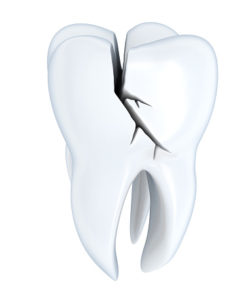
Tooth fractures can happen to people of all ages. However, fractures are more common for patients over the age of 25. When a fracture is present on a tooth, the tooth can become sensitive to temperature changes. The pressure exerted on a tooth when chewing can be painful when a tooth has fractured. The pain may not be consistent and can come and go. The nonpersistent pain makes it challenging for a dentist to locate a fracture. It becomes even more complicated if the fracture is small.
Four General Categories of Tooth Fractures
- Craze lines are fine cracks that occur on the tooth enamel. This type of crack does not cause pain or require treatment.
- A vertical crack occurs up and down the tooth. Vertical cracks extend from the gum line towards the biting surface of a tooth. If the fracture has reached the gum line, this may necessitate further treatment. The cracked tooth may need to be extracted. However, if the crack does not extend to the gum line, the tooth could be saved.
- A split tooth, as the name implies, the tooth has separated into two segments. The split tooth is often the result of an untreated cracked tooth. The tooth may need to be extracted.
- Fractured cusps often occur around a dental filling. A cusp is the pointed part of the tooth’s biting surface.
Common Symptoms of Tooth Fractures
Not every fracture will cause pain. Some cracks may be present for many years before you start to feel pain. Some signs of a fractured tooth can be painful or cause tooth sensitivity. A cracked tooth hurts because the fracture exposes the pulp inside the tooth. If the pulp becomes infected or damaged, a root canal may be required to relieve the pain. Here are a few common symptoms to look out for if you suspect a cracked tooth.
- Sharp pain when you bite or chew.
- Sensitivity to heat and cold.
- Gum becomes swollen around the tooth.
- Pain that comes and go.
If chewing and cold or hot foods are causing you pain, you could have a cracked tooth. Leaving a cracked tooth untreated may lead to more problems, pain, and discomfort over time. A dentist can easily diagnosis a cracked tooth during your regular dental check-up.
If you suspect you have a cracked tooth, be sure to contact California Dental Group at 800-407-0161 to make your appointment.

